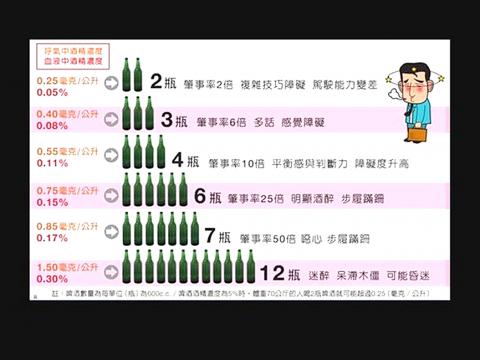The Ministry of Transportation and Communications supports the use of ignition interlock devices to curb drunk-driving recidivism, a source close to the ministry said.
The ministry’s apparent change in stance came after a meeting of the legislature’s Transportation Committee yesterday.
The committee was charged with conducting a preliminary review of proposed amendments to the Road Traffic Management and Penalty Act (道路交通管理處罰條例) ahead of a plenary session today.

Photo courtesy of Taichung City Police Department Traffic Police Corps
Lawmakers could push the amendments through their second and third reading today if negotiations between legislative party caucuses and ministry officials go smoothly.
The ministry had previously expressed reservations about making the devices mandatory equipment for drivers with a drunk-driving record, citing a lack of universally accepted specifications for the devices and high costs.
No such device exists for motorcycles and there is the possibility of drunk drivers asking a sober person to unlock the device for them, the ministry said in a report.
However, Minister of Transportation and Communications Lin Chia-lung (林佳龍) is considering supporting the devices’ use after lawmakers offered convincing arguments about their benefits to deter drunk-driving recidivism, the source said.
Ministry officials are drafting regulations for negotiations between party caucuses today, they added.
Democratic Progressive Party Legislator Hsiao Bih-khim (蕭美琴) cited EU research as saying that the devices have helped reduce drunk-driving accidents by 40 to 90 percent, adding that a US study shows that the devices reduced drunk-driving recidivism by 70 percent.
Parents in the US also have the devices installed in their vehicles to prevent their children from driving under the influence of alcohol, she said.
The Taiwanese government, on the other hand, kept delaying their use to deter drunk-driving recidivism, she added.
It is unacceptable that the ministry has used the device’s high retail price — NT$100,000 to NT$150,000 — to argue against their use, Lin said.
Similar devices can be bought for US$799 from Amazon.com, which is cheaper than what the ministry has reported, she said.
Vendors selling the devices in Taiwan might have quoted an excessively high price to the ministry, Lin said, adding that her proposed amendment would not target all drivers, but only drunk drivers, who would be obligated to pay for the cost of installing the devices on their vehicles.
Department of Railways and Highways Director-General Chen Wen-ruey (陳文瑞) said that the ministry does not oppose having the devices installed on vehicles, but added that they cannot be installed on motorcycles or older vehicles.
The issue required further research, Chen added.
Meanwhile, lawmakers yesterday agreed to double the fines for drunk bicyclists to between NT$600 and NT$1,200.
Cyclists who refuse to take an alcohol test would be fined NT$2,400.
The ministry proposed that lawmakers impose different fines for drunk drivers and motorists who refuse to take an alcohol test, saying that the fines for the former would remain between NT$15,000 and NT$90,000, while those for the latter would be raised to between NT$30,000 and NT$90,000.
In addition to installing ignition interlock devices and raising fines for drunk drivers, ministry officials are to negotiate with lawmakers on a range of proposed amendments today, including extending the minimum duration for which the government can suspend or revoke a drunk driver’s license or license plates, confiscating a drunk driver’s vehicles if they refuse to take an alcohol test and cause death or injury, and whether passengers riding with drunk drivers should be held accountable.

Taiwanese can file complaints with the Tourism Administration to report travel agencies if their activities caused termination of a person’s citizenship, Mainland Affairs Council Minister Chiu Chui-cheng (邱垂正) said yesterday, after a podcaster highlighted a case in which a person’s citizenship was canceled for receiving a single-use Chinese passport to enter Russia. The council is aware of incidents in which people who signed up through Chinese travel agencies for tours of Russia were told they could obtain Russian visas and fast-track border clearance, Chiu told reporters on the sidelines of an event in Taipei. However, the travel agencies actually applied

Japanese footwear brand Onitsuka Tiger today issued a public apology and said it has suspended an employee amid allegations that the staff member discriminated against a Vietnamese customer at its Taipei 101 store. Posting on the social media platform Threads yesterday, a user said that an employee at the store said that “those shoes are very expensive” when her friend, who is a migrant worker from Vietnam, asked for assistance. The employee then ignored her until she asked again, to which she replied: "We don't have a size 37." The post had amassed nearly 26,000 likes and 916 comments as of this

New measures aimed at making Taiwan more attractive to foreign professionals came into effect this month, the National Development Council said yesterday. Among the changes, international students at Taiwanese universities would be able to work in Taiwan without a work permit in the two years after they graduate, explainer materials provided by the council said. In addition, foreign nationals who graduated from one of the world’s top 200 universities within the past five years can also apply for a two-year open work permit. Previously, those graduates would have needed to apply for a work permit using point-based criteria or have a Taiwanese company

The Shilin District Prosecutors’ Office yesterday indicted two Taiwanese and issued a wanted notice for Pete Liu (劉作虎), founder of Shenzhen-based smartphone manufacturer OnePlus Technology Co (萬普拉斯科技), for allegedly contravening the Act Governing Relations Between the People of the Taiwan Area and the Mainland Area (臺灣地區與大陸地區人民關係條例) by poaching 70 engineers in Taiwan. Liu allegedly traveled to Taiwan at the end of 2014 and met with a Taiwanese man surnamed Lin (林) to discuss establishing a mobile software research and development (R&D) team in Taiwan, prosecutors said. Without approval from the government, Lin, following Liu’s instructions, recruited more than 70 software